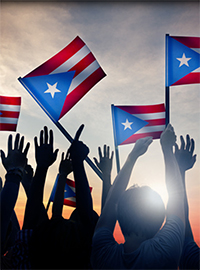| The Puerto Rican Government Bailout that Only Few Know (and We're Pretty Sure They Don't Want You to Know) |
 |
|
By Thomas Humber
Thursday, May 12 2016 |
Who knew that the scariest word to official Washington these days isn't ISIS? It isn't Iran or North Korea or Russia. It isn't even indictment. It's “bailout.” We learned that when CFIF ran some television and radio ads and sent around some position papers saying that Congress was about to bail out the Puerto Rican government. We were very specific on how that was going to happen ... and who was going to pay for it: those who invested in Puerto Rico's bonds on the promise that they were safe, so safe they were backed by Puerto Rico's constitution (which many now seem to consider merely a suggestion, not that pesky rule of law stuff). Then all hell broke loose. “It isn't a bailout; it isn't a bailout; it isn't a bailout,” screamed they who are up to their necks in the bailout. What? “It isn't a bailout; it isn't a bailout; it isn't a bailout,” they screamed louder, joined by their designated media hod carriers. Why not? “Because it doesn't meet our definition of bailout. A bailout can only be when the government forces U.S. taxpayers to pay, which taxpayers who are also voters really, really don't like.” So a bailout of Puerto Rico on the backs of U.S. taxpayers would be bad? “Like the plague bad for those of us elected to office who have to run again.” So if there were a bailout like that, on the backs of U.S. taxpayers, those taxpayers would be right to be up at arms? “Absolutely. Why do you ask?” Because that bailout is already up and taking. Has been since 2010. “Sorry ... got to go now. Votes to take. Hands to shake.” We are deeply indebted to Brian Faler, a senior tax reporter for Politico Pro, whom we now quote from an eye-opening piece he wrote this week: “Lawmakers say they absolutely, positively will not bail out Puerto Rico, but here's the thing: The federal government already is bailing out Puerto Rico. “The Obama administration effectively has been providing the beleaguered island with billions of dollars in aid through a little-noticed and convoluted tax arrangement. With the help of a Washington law firm, Puerto Rico in 2010 created a special corporate levy aimed at getting money out of the U.S. Treasury, and the IRS has refused to rule on whether it's legitimate. U.S. companies located on the island act as middlemen: First they pay taxes to the commonwealth, and then they are made whole when they claim foreign tax credits from the U.S. “The aid, which in some years amounts to more than 20 percent of Puerto Rico's budget, was never approved by Congress, and some analysts question whether the arrangement is constitutional. “They say it amounts to just the sort of bailout lawmakers now working on a rescue package have forsworn.” To taxpayers who don't like being hornswoggled, we strongly recommend Faler's entire piece, which explains the hidden deal in detail. And we do mean hidden. When Faler asked House Speaker Paul Ryan's spokesman about it, he said he wasn't familiar with it. The purpose of this piece is not to get down into the weeds of blame. It is to ask, strongly, if the Congress of the United States knows so little about the true state of Puerto Rico's Byzantine finances, why, in its collective ignorance, is it pushing so hard for a bailout (by our definition)? |
Related Articles : |
























